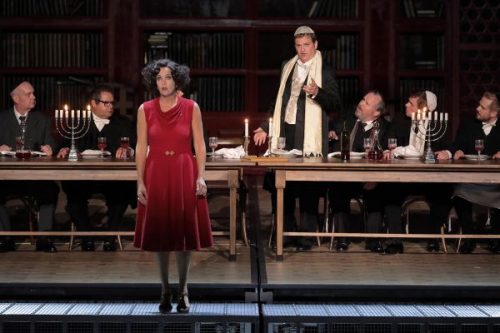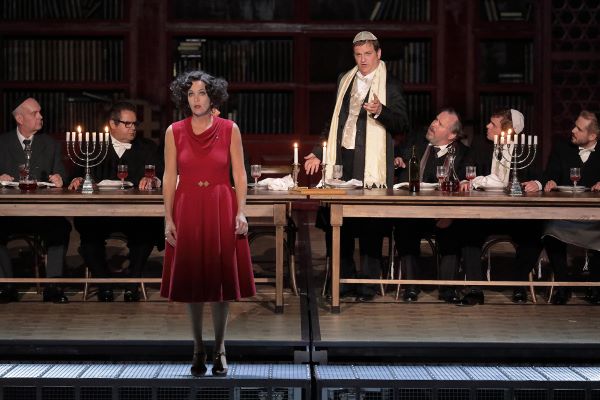 Germany R. Strauss, Salome: Bayerisches Staatsorchester / Kirill Petrenko (conductor). Nationaltheater, Munich, 13.10.2019. (MC)
Germany R. Strauss, Salome: Bayerisches Staatsorchester / Kirill Petrenko (conductor). Nationaltheater, Munich, 13.10.2019. (MC)

Production:
Stage Director – Krzysztof Warlikowski
Sets and Costumes – Małgorzata Szczęśniak
Lighting – Felice Ross
Choreography – Claude Bardouil
Cast:
Salome – Marlis Petersen
Jochanaan – Wolfgang Koch
Herod – Wolfgang Ablinger-Sperrhacke
Herodias – Doris Soffel
Narraboth – Evan LeRoy Johnson
Herodias’s Page – Rachael Wilson
First Soldier – Martin Snell
Second Soldier – Alexander Milev
First Jew – Scott MacAllister
Second Jew – Roman Payer
Third Jew – Kristofer Lundin
Fourth Jew – Paul Kaufmann
Fifth Jew – Peter Lobert
First Nazarene – Callum Thorpe
Second Nazarene – Ulrich Reß
In 2014 at Nationaltheater I reported from a compelling Bayerische Staatsoper production of Richard Strauss’s Salome directed by William Friedkin with his design team Hans Schavernoch and Petra Reinhardt. Another first-class production I encountered on DVD/Blu-ray directed by Jürgen Flimm was even more astonishing and provocative, exactly as I imagined Salome should be staged. Filmed live, the 2008 Metropolitan Opera production starred Karita Mattila (Salome), Kim Begley (Herod), Juha Uusitalo (Jochanaan) and Ildikó Komlósi (Herodias). This summer the Bayerische Staatsoper commenced a new production of Salome directed by Krzysztof Warlikowski and designer Małgorzata Szczęśniak.
Based on Oscar Wilde’s tragedy, Strauss’s one act opera Salome combines a Biblical theme based on the slaying of prophet Jochanaan (John the Baptist) with a powerful erotic impetus. Following its première in 1905 audiences flocked to see Salome which provoked a wide range of reactions from shock and revulsion to astonishment and wonder. The lucrative contracts Strauss gained from the astonishing international success of Salome ensured financial security and paid for his spectacular villa at Garmisch, Bavaria.
I know the Salome libretto well but in the absence of a directorial note it was puzzling making sense of the context that stage director Krzysztof Warlikowski was trying to achieve. Employing a modern-day mise en scène designer Małgorzata Szczęśniak’s set centred around what appeared to be a synagogue room inhabited by a secretive group of suited Jewish men wearing tzitzits, kippahs etc. sitting at long tables lit by menorahs. The three walls were fitted with shelves right up to the ceiling filled with books. The stage floor and rear bookcases could be split open wide in the centre to reveal a plain metallic floor area that was raked at an angle sloping upwards away from the audience. With the rear wall opened and free of the bookcases there were moving projections of seemingly ancient Hebrew illuminated panels with plants and mythical creatures.
In this disappointing production Warlikowski missed out on the shock value and horror of Salome demanding the murder of Jochanaan and having his head removed. I have compiled a long list of problems but here are the main ones. Jochanaan was seen crawling from a partially obscured cage at the front of the stage in a scene devoid of any sense of tension or fear: he might easily have been looking for something he had dropped. Dressed in a tatty blue jumper and looking more like one’s favourite uncle Jochanaan certainly didn’t resemble a remarkable figure to be feared, as director Jürgen Flimm so successfully portrayed. Salome’s carnality for Jochanaan was underplayed as was Herod’s lust for Salome. Lacking impact and a real anticlimax was the killing of Jochanaan, and Salome not opening the box (puzzlingly branded with the number 237890) containing his head and kissing it. Puzzling was the regular presence of a young girl in a blue dress sat by the back wall. Most perplexing of all was the appearance of Jochanaan loafing onto the stage before the end. Afterwards I heard some wag comment that Wolfgang Koch must have mistimed the curtain call and come on too early.
What saved this production from oblivion was lyric soprano Marlis Petersen giving a truly great performance of the title role that will live long in the memory. Highly assured and expending great energy with the vocal and physical demands of the role, Petersen’s voice conveyed considerable emotion. Together with superb acting and undoubted stage presence she made a striking impression as Salome. The dark-haired Petersen looked stunning in the sleeveless crimson dress she wore predominantly throughout. Although, I didn’t especially enjoy the choreography of the ‘Dance of the Seven Veils’ which was rather bereft of veils to cast off, Petersen gave a most compelling performance. I have nothing but admiration for Petersen’s ability to sing so effectively whilst moving energetically about the stage. Lack of weight in her top register seemed to be negated by her outstanding acting ability.
As Jochanaan, Wolfgang Koch’s singing had little conviction and only nominal thrust. Wolfgang Ablinger-Sperrhacke took the role of Herod, giving a somewhat lackluster performance and as mentioned above appeared unconvincing in his lustful desires. As Salome’s mother the classily dressed Herodias, Doris Soffel a super actress, was persuasive in her mezzo-soprano role. Tenor Evan LeRoy Johnson made the most of the secondary role of Narraboth and I look forward to hearing him in something more substantial. Under its general music director Kirill Petrenko, the world class Bayerisches Staatsorchester played as well as expected in the sumptuous music it knows so well. Always alert and supportive to the performers on stage and radiating energy and excitement Petrenko’s close relationship with the orchestra was palpable. Drowning the singers with orchestral volume was never on Petrenko’s agenda.
From my seat no English surtitles were visible only the German ones which was a cause of some disappointment, so those needing them ought to do some checking. Although not enamoured with Krzysztof Warlikowski’s staging of Salome, the performance of Marlis Petersen was cause for celebration.
Michael Cookson
